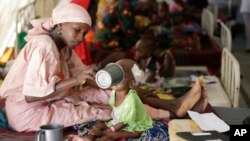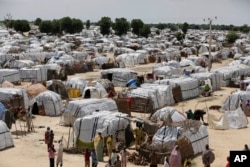The World Food Program is sounding the alarm over a severe funding shortfall in Nigeria that could endanger the lives of 4.7 million people affected by hunger in the nation's volatile northeast.
The U.N. agency has received just under 15 percent of the $416 million it needs for its operations in Nigeria this year.
In the next five or six months, says WFP Acting Regional Communications Officer Elizabeth Bryant, the U.N. agency needs $200 million to keep feeding Nigeria's hunger-stricken population.
Experts predict that the annual lean season — usually, the waiting period before the next harvest — could come as early as May, after two years of failed harvests in the agricultural northeast, Bryant told VOA, adding that funding needs are urgent.
"We need it now, " she said from Dakar, "so that … we have food lined up, that we're prepared. And in fact, the food is there, we just need to have the money to be able to buy it and distribute it to people in need."
The agency has contingency plans which include reducing rations, Bryant says, but officials are appealing to donors to act now to prevent the situation from becoming a famine.
"At that point, a lot of lives have already been lost," she said, "and the other thing is it costs a lot more, financially, to react to … a famine, than to try to avoid one."
Nigeria is one of four nations on the brink of famine. Yemen, South Sudan and Somalia are also facing dire hunger, in what U.N. officials say is the largest humanitarian crisis since the international body's creation.
The insecurity and mass displacement caused by the now seven-year Boko Haram conflict in northeastern Nigeria has brought farming to a near halt. Some parts of Borno state have been off-limits to aid workers due to fighting.
The Nigerian government's chief humanitarian coordinator, Dr. Ayoade Alakija, told VOA that this is not just a threat to Africa's most populous nation. It is also a threat to millions of families in Chad, Niger and Cameroon who rely on Nigerian agriculture.
"Because these people would farm, and they would farm their millet and their maize and their beans — and it would be exported to those other countries and that was how they got their livelihoods. But also, that is how those countries got their food," Alakija said.
In an op-ed published Friday in the French newspaper Le Monde, the U.N. deputy humanitarian coordinator in Nigeria warned that a suspension of relief efforts in northeastern Nigeria could render the area more vulnerable to the spread of extremism.
Ricci Shryock contributed to this report from Dakar.





